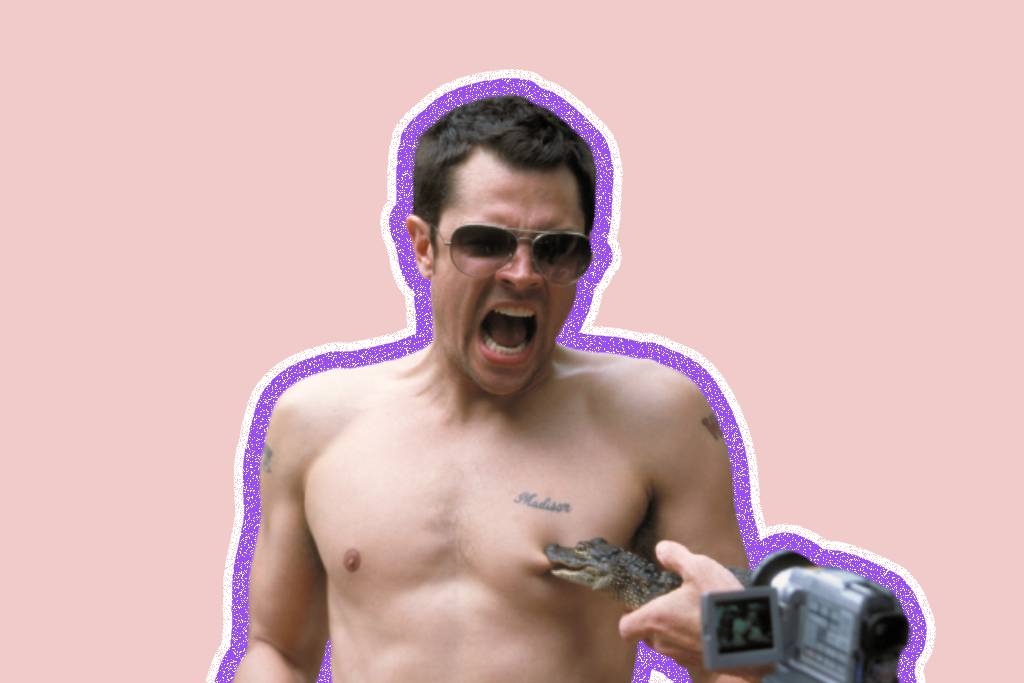‘Jackass’ Has Always Been Deeply, Deeply Queer
They were frat boys taken to their logical extreme, a fragile conception of maleness pushed to its very breaking point.

Back in 2010, Steve-O and Johnny Knoxville sat down with Vanity Fair and said the quiet part out loud: Jackass, the pioneering MTV television show that they had spun into a successful movie franchise, is gay.
“We always thought it was funny to force a heterosexual MTV generation to deal with all of our thongs and homoerotic humour,” Steve-O told journalist Eric Spitznagel. “In many ways, all our gay humour has been a humanitarian attack against homophobia. We’ve been trying to rid the world of homophobia for years, and I think gay people really dig it too.”
It was the first time that the stars had ever admitted that their fixation on dicks and the pains and pleasures that can befall them went deeper than mere frat humour. But for astute fans, the writing had been on the walls for years.
John Waters, a longstanding hero of the queer community, had cameoed in Jackass: Part Two, as had a t-shirt worn by Knoxville emblazoned with the tongue-in-cheek words “I’m Straight” and a picture of a unicorn. Hell, the third film had opened with the cast and crew assembling themselves alongside the colours of a rainbow, and the second one had ended with a high camp musical number.
Your reminder that Jackass is gay and was always meant to behttps://t.co/BGHxU3YQGp pic.twitter.com/7eSRhxbjxd
— Kai (@kamilumin) July 20, 2021
As many on Twitter have already pointed out, Steve-O had nothing to gain from explicitly aligning his franchise with the LGTBIQ community — this was long before the era in which claiming queer cred was a commonplace tactic for brands, designed to win easy points while doing as little work as possible. He wasn’t trying to drum up more press, or inspire a few thousand thinkpieces. He was merely making the franchise’s subtext into text, drawing attention to a subversive camp that Jackass had been streaked with from its very conception.
The Key To Jackass Is Subversion
Speaking of Waters, Jackass has long been a prime example of what the filmmaker meant when he delineated between “good bad taste” and “bad bad taste.” Jackass could easily have fallen into the latter category, what with its poo jokes and the joyously adolescent bond between the show’s heroes. But there is something deeply smart about Jackass‘ stupidity — something self-aware and acute.
It takes skill to make hours of deliberatively repetitive content compelling; intelligence to craft movies that slowly escalate in extremity. Sure, that’s the skill of a hammer striking upon nails rather than a surgeon’s scalpel sliding over skin, but it’s skill nonetheless; an awareness of audience expectations and how to subvert them.
Indeed, subversion is the name of the Jackass game. For every proposition that the franchise suggests, it presents its counter with just as much force. Consider an iconic moment in the second film: Knoxville and a fellow stuntman hug the top of a tree while metres below, their friends rev a chainsaw, preparing to cut them both down to the ground.
“Do you ever get scared at times like these?” the stuntman asks Knoxville, falteringly. Without missing a beat, Knoxville replies: “yeah,” he says, his voice quiet. And just like that, the bravado that is the key to Knoxville’s entire persona drops away.
Forever young and still funny in the head. Check out the NEW trailer for #JackassForever and see our big dumb movie in theaters everywhere October 22, 2021. pic.twitter.com/9ymUlODTmP
— jackass (@jackassworld) July 20, 2021
Then there is the show’s axe-wielding approach to Americana. The Jackass crew threw everything middle-class and middle-brow into their potent stew: grandpas; marching bands; professional athletes; hazing rituals; bullfighting. While mounting stunts as crude as flinging a portaloo thousands of feet into the air, Knoxville and his fellow miscreants chewed up American culture from the inside, reflecting images of the heteronormative culture in which they lived through a warped mirror. They were frat boys taken to their logical extreme, a fragile conception of maleness pushed to its very breaking point, covered in dicks and dildos and bare naked bodies.
After all, most men know that very straight scenarios are also very gay — dick-measuring contests, feats of athletic strength, the masculine obsession with the body and stink and sweat. In its extremity, Jackass simply made clear what was already there.
Camp, Camp, Camp
Susan Sontag once wrote that the key to campness is that it is alive to the “myriad of ways things can be taken.” So it goes with Jackass. You can read whatever you want into the show and its ensuing movies — the franchise is a Rorschach test of smeared shit, just vague enough to be contorted into whatever form the viewer desires.
Is it a comment on the reductive nature of television, a medium that prides itself on its ability to strip out narratives of complexity and turn them into digestible forms? Yes, if you want it to be. Is it the natural progression of silent-era pratfalls and touring carnival shows, a purely sensory experience designed not to generate thought, but awe? Also yes. Is it queer as hell? Definitely.
Essentially, when you talk about Jackass, what you’re really talking about is yourself; about what you want from cinema, and art more generally, and life. Such is the power of a group of guys standing in a circle, watching a man shove his mouse-costumed dick into a snake pit, his eyes firmly shut, waiting for the bite.
Joseph Earp is a Jackass fanatic and staff writer at Junkee. He tweets @JosephOEarp.